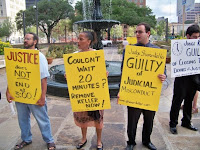Chuck Lindell of the Austin American Statesman has been producing excellent journalism on the Sharon Keller case. In a blog post today, he reports on the exchange on the stand between Keller and prosecutor Mike McKetta. During the exchange, Keller confirmed that she used the phrase “we close at 5” during the telephone conversation on Sept 25, 2007 with general counsel Ed Marty.
Based on Cheryl Johnson’s testimony on Monday that Johnson was the duty judge and Keller’s testimony Tuesday, it is clear that Keller violated the Execution Day Procedures and should be removed from office.
McKetta: “You have no precise recollection of the words you used?”
“Right.”
McKetta: “You remember saying ‘No, why?’ … And your best recollection is that Ed Marty said, ‘They wanted to file something but they were not ready.’ … And you said, ‘No,’ right?”
Keller agrees.
Then McKetta pointed to an Oct. 3, 2007 Austin American-Statesman article that quoted Keller as saying: “And given the late request, and with no reason given, I just said, ‘We close at 5.’ I didn’t really think of it as a decision as much as a statement.”
On Tuesday in court, McKetta asked: “You did say we close at 5?”
Keller: “I think I did.”
McKetta: “So you didn’t just say, ‘No, why?’ and ‘No’?
Keller: “I think I did.”
XXX
McKetta: “So in addition to ‘No, why?’ and ‘No,’ there was a clear statement that we close at 5?
Keller: “I told him that we close at 5.”
XXX
McKetta: “At a minimum, you knew they wished to file and were not ready?”
Keller agrees.
McKetta: “What more did you ask to know before you said no a second time?”
Keller: “I don’t remember.”
Questions about following the Court of Criminal Appeals’ execution-day procedures:
“You knew that this (call from Marty) was about tonight’s execution?” McKetta asked.
“Yes.”
McKetta: “You knew you were not the assigned judge?”
“Yes.”
McKetta: “You knew there was an assigned judge?”
“Right.”
XXX
McKetta: “You were aware that the lethal injection protocol might be basis for a challenge (by Richard) that very day?”
“Yes.”
XXX
McKetta: “You knew the call dealt with the scheduled execution?”
“Right.”
“You knew it dealt with somebody making a call to the court?”
“Right”
“That it was about that night’s execution?”
“Right.”
“That you were not the assigned judge?”
“Right.”
“That there was an assigned judge?”
“Right.”
“That if the execution were to take place that it could not be undone?”
Keller agrees.












